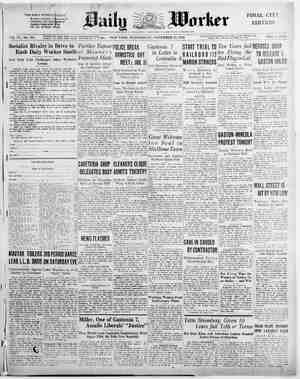Evening Star Newspaper, November 13, 1929, Page 16
You have reached the hourly page view limit. Unlock higher limit to our entire archive!
Subscribers enjoy higher page view limit, downloads, and exclusive features.
ONLY A FEW generations ago the life of man was circumscribed by his own physical limitations . . . the dexterity of his fingers, the strength of his back, the speed of his limbs, and the labor of domestic animals, The interchange of commodities was slow, difficult. There were no good roads, as we know them today, nor any way to travel swiftly, surely, over these roads. The deeply rutted wagon trail was a long, hard trail. ‘Though boundless acres were all about, it was only the adventurous few who traveled far. Many a man lived and died without ever having been more than fifty miles from home. Then was born an idea that was destined to reshape the frontiers and the future of the entire country—the idea of making a small, strong, simple automobile so low in price that it might be placed within the means of all the people. : THE EVENING STAR, WASHINGTON, D. C., Extending WEDNESDAY, NOVEMBER 13, 1929. the Limits of Man’s Power has lightened the Sarmer’s burdens and shortened the miles to town The coming of this new means of trans. portation not only changed the industrial life of the nation, but helped to change the pri- vate lives of every one for all the generations to come. It leveled hills, extended horizons, created new opportunities, furnished the means to earn more money and to enjoy the leisure which that increased income should bring. In creating and building a small, strong, simple automobile at a low price, and in using it, man became accustomed to thinking of machinery as a servant. He made power work for him. More and more as time went on, in indus- trial plants and on the farm, heavy labor was taken off the back of man and placed upon the broader shoulders of the machine. The Ford moved everywhere, blazing the way over miry roads and rocky mountain trails, through gumbo and sand, creating a rising demand for swifter, smoother travel that resulted in the construc- tion of hundreds of thousands of miles of cement and mac- adam highways reaching to all parts of the country. The benefits resulting from the introduction of the low- priced automobile have done 2588 saaa) RLEETT Toall bere ~the edvantages of economical Eransportation ortunity P e Maine speaks to California—in linois! more than perhaps any other single thing to increase the standards of living and to make this a truly united country. All the people are blended together by the flexibility and swiftness of automotive trans- portation. The prairie farmer, the industrial worker and the city business man are gov- erned by similar impulses, similar tastes, simi- lar demands upon highly specialized machinery to serve them. This civilization can show no greater ex- ample of disciplined machinery than in the operation of the Ford Industries. The great miracle is not the car, but the machines that make the machine—the methods that make it possible to build such a fine car, in large numbers, at a low price. Craftsmanship has been put into mass pro- duction. Millions and millions of parts are made—each one so accurate and so exactly like the other that they fit perfectly to the thousandth of an inch when brought together for assembly into complete units. Men by the thousands and the hundred thousand are employed at the Rouge plant alone and there are hundreds of acres of plant equipment. Yet the purpose today is wholly the same as when the equipment of the Ford organization was housed in a single small building. Everything that has been done has been done to give further scope and expression to the Ford Idea. That idea is not merely to make automo- biles—not merely to create so much additional machinery and so many millions of additional horse-power—but to make this a better world in which to live through providing economical transportation for all the people. For that purpose the first Model T was made twenty-one years ago. For that purpose the new Ford is made today. In 1929, as in 1908, it is again helping to reshape the frontiers and the future of the country and to further extend the limits of man’s opportunity. ForD MotoR COMPANY Detroit, Michigan




